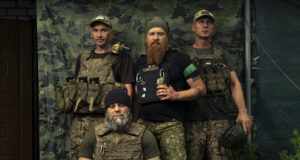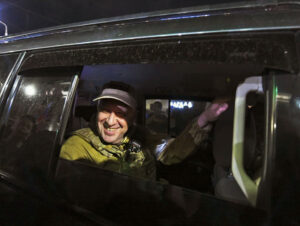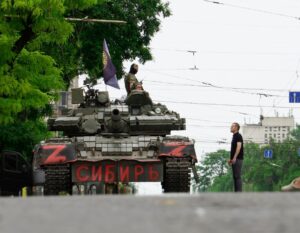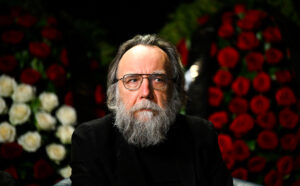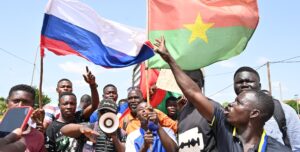Just outside Moscow, Russian migration lawyer Timur Beslangurov is looking for residents for his new Potemkin Village. But unlike the fake one supposedly constructed by Russian nobleman Grigory Potemkin to impress Catherine the Great, Beslangurov’s village and its inhabitants will be quite real.
Planned for the Serpukhov district south of Moscow, it is to be a home for Western expatriates who are tired of the “radical values” of their supposed democracies. “Today, they have 70 genders — and who knows what will come next,” Beslangurov reportedly told a conference in St Petersburg. He claims they have identified around 200 “normal people” to move there, mainly Christians fearing the end of their faith in the West.
There is already a small community of Westerners in Russia: some, such as Australian John Helmer, have been there since the Cold War, while others have emigrated more recently, including ex-cop and fugitive Floridian John Mark Dougan, who skipped town just as the FBI was about to arrest him on hacking charges. Even more have arrived in the past year, firmly picking a side in the war against Ukraine, as ex-US soldier John McIntyre did. This rump of foreigners is more critical to upholding President Vladimir Putin’s legitimacy than it is given credit for.
The Russian-based Canadian Eva Bartlett, for example, uses her social media channels to advance the idea that the fighting in Ukraine is a “US proxy war against Russia”, and that Western media and US intelligence agencies are covering up “the fact that Ukraine is committing genocide”. She vents to her 150,000 followers on Twitter, and another 32,000 on her Telegram channel, and is still promoted by far-Left groups in Canada. Meanwhile, Thomas Röper, the German-Russian editor of a pro-Russian blog, whose YouTube channel has 120,000 subscribers, has travelled throughout Russian-occupied Ukraine at the invitation of Moscow, even serving as an “international observer” for sham referendums held in the Donbas region.
McIntyre, for his part, was initially fighting alongside the International Legion of Territorial Defense of Ukraine, the unit defending Ukraine against the Russian invasion. Then, earlier this year, he deserted, only to pop up in Moscow not long after. He claims to have been spying for Russia from the very beginning.
Russia has been only too happy to give these figures a home and a platform. Bartlett and Röper are both frequent contributors to the RT propaganda network, and were also invited, alongside Dougan and several other Westerners, to testify before the International Public Tribunal on Ukraine: a series of hearings, run by a Russian government body in Moscow, that have accused Ukraine of war crimes and developing biological weapons.
In some cases, these influencers reinforce Russian foreign policy. Bartlett, for example, has toured Syria at the invitation of Bashar al-Assad, and helped peddle the idea that rebels and internationally respected medics launched chemical weapons attacks inside Syria, rather than the Syrian military. It’s a thoroughly debunked allegation that aligns closely with the obfuscation pushed by the Russian government and its client, al-Assad.
In other cases, they reinforce the idea of Putin as a benevolent actor. Over the past year, the President’s personal future and the longevity of his kleptocratic regime have been shaken to the core: beset by a stalled invasion; destabilised by an aborted coup; and frustrated by the exodus of hundreds of thousands of Russian citizens fleeing his partial mobilisation. Throughout it all, Moscow has tried to project not just strength and stability, but the idea that Russia is a guiding beacon for the rest of the world, a symbol of traditional values.
This certainly works in Africa and the Middle East, where Moscow’s social values, particularly around religion and sexuality, better reflect the cultural norms than does Western decadence. It also aligns well with the American and European Right. Tucker Carlson has frequently held up Putin as an antidote to America’s wokeness. In France, Marine Le Pen and Éric Zemmour have both, at various times, hailed Russian values. And Hungarian Prime Minister Viktor Orbán has styled himself after the Russian dictator, lamenting that his nation is under assault by Western liberalism.
All of this is to Putin’s benefit. The idea that Westerners themselves are validating Putin’s warnings about the moral decay and irreligious apostasy of Nato countries is useful to the Kremlin. The idea that some of those Westerners would come to Russia to fight, even die, for Putin’s political project is even more compelling.
Take Dougan. He told me last year that he planned to help train the Russian-backed separatists. “The Donetsk People’s Republic have captured a bunch of the Javelin missiles sent to them by the American government,” he told me on a video call from Moscow. “When I was in the United States Marine Corps, I happened to be an anti-tank assault man. And my goal is to teach them how to use these missiles to defend themselves… I’m going to give them a way to fight back.” While he declined to confirm if he ever actually went to train them, he did say that, more recently, he had trained with Chechen fighters. (“Those guys are awesome shooters,” he told me this week.)
The West has, for now, opted to ignore this small cohort of Putin propagandists, probably just a few hundred strong. But even that small cohort wields outsize influence. And if it wanted to, could the West act against them? Western states do carry a legal prohibition of sorts on joining a foreign conflict, absent a declaration of war — these laws, however, are selectively and rarely enforced.
In March 2022, American law professor Dakota Rudesill called on the US government to offer some clarity as to who may, or not may not, run afoul of the Neutrality Act in Ukraine. That clarity never came. Rudesill tells me that it is still unclear whether it is legal to travel to Russia to join the fight. Given how much evidence has been posted on social media about these foreign volunteers, he says: “I am confident that a fair number of Americans who have joined the fight on both sides could be charged if the Justice Department as a matter of prosecutorial discretion decided to do so.”
Clearly, the Biden administration is unlikely to target anyone fighting alongside Ukraine. But, Rudesill says, a future administration could break with Biden’s pro-Ukraine stance. Without clarity on the law, he says, the Department of Justice could “start prosecuting Americans who have been resisting the invasion”.
Congress could modernise the law — both by updating the Neutrality Act to reflect modern realities, and by expressly forbidding Americans from joining foreign wars, while also specifically exempting those fighting for Ukraine. (Such a bill, to provide legal cover for the Ukrainian volunteers, has already been introduced in the House of Representatives.) The UK’s Foreign Enlistment Act, and similar legislation in its former colonies, is equally antiquated and selectively enforced, but still in effect.
There are other legal mechanisms to draw on. Western sanction laws are probably the most practical: many of those living and working in Russia are, almost certainly, in violation of them. The European Union has classified the Russian government as a state sponsor of terrorism, and there is a movement afoot to have the US follow suit. Such a designation would come with a spate of legal prohibitions. The United Kingdom is getting ready to classify Wagner Group as a terrorist entity, and other countries are considering following suit. That could mean anyone fighting alongside them could be prosecuted much like those who joined the Islamic State.
Ukraine may also insist on trying some of the fighters for war crimes, even if they are American, Canadian or European. There is also some precedent in the country for prosecuting propagandists if they are found guilty of inciting genocide.
When the West was called upon to repatriate its citizens who had joined Islamic State and wreaked havoc in Syria and Iraq, it — by and large — shirked its responsibility. As a result, tens of thousands of foreigners have been left to rot in the Middle East. Some are former combatants, whom, even years later, Western governments are still disinterested in prosecuting. Others are women and children who had no hand in the fighting or brutal violence, and yet many states still refuse to take them back.
With this in mind, Western countries ought to clarify the situations in which their citizens could face prosecution for their participation in Putin’s war. This may, in some cases, be purely academic: they may simply never leave Russia again. But as Yevgeny Prigozhin’s march on Moscow showed, the Russian state may be less stable than we thought. And if the President were to fall, what would become of his useful idiots. Suddenly, that brand new Potemkin village might not look quite so appealing.
Disclaimer
Some of the posts we share are controversial and we do not necessarily agree with them in the whole extend. Sometimes we agree with the content or part of it but we do not agree with the narration or language. Nevertheless we find them somehow interesting, valuable and/or informative or we share them, because we strongly believe in freedom of speech, free press and journalism. We strongly encourage you to have a critical approach to all the content, do your own research and analysis to build your own opinion.
We would be glad to have your feedback.
Source: UnHerd Read the original article here: https://unherd.com/

